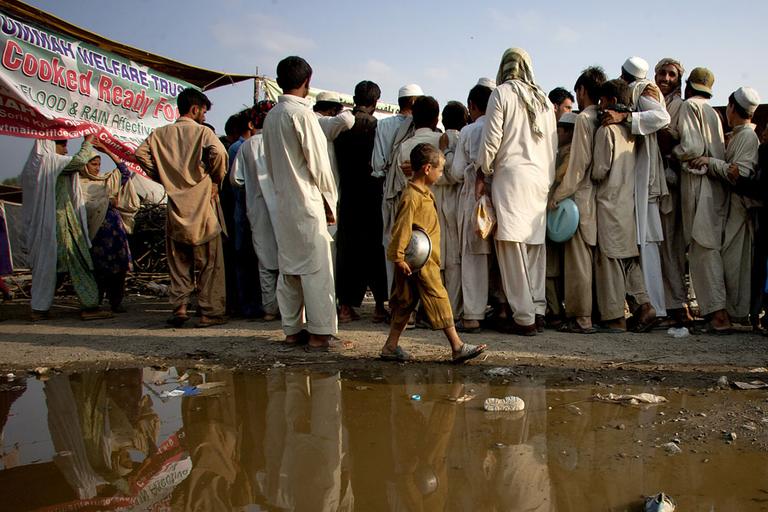Advertisement
Floods Test Defenses For Southern Pakistani Cities

Emergency workers worked frantically Monday to shore up a system of levees protecting two southern Pakistani cities from floodwaters that have devastated wide swaths of the country, as a U.N. official warned that the crisis is "outrunning our relief efforts."
The floods, which began nearly a month ago with hammering rains in the country's northwest, have destroyed or damaged 1.2 million homes and affected 17.2 million people, U.N. spokesman Maurizio Giuliano said. About 1,500 people have died in the floods, most in first few days, though the scale of the crisis — with immense social dislocation and agricultural destruction — continues to grow.
"The floods are outrunning our relief efforts. We move faster and faster, but the finish line keeps moving further ahead," Giuliano said. "This is turning out to be a marathon, not a sprint."
While the floodwaters are slowly moving toward the Arabian Sea, where they can drain away, the rainfall has been so intense that enormous parts of the country remain submerged.
In Shadad Kot, in the southern province of Sindh, authorities are increasingly worried that even the 10 miles of new levees soldiers have built to protect the city, and Qambar city further to the south, may not hold back the massive floods.
Workers were piling stones and sandbags to plug leaks in the levees, trying to stay ahead of any damage to the defenses.
"It is the last-ditch effort to save the city," said Brig Khawar Baig. "We are trying to block the water here. If it crosses over, we fear it will go further south and inundate more towns."
Ninety percent of Shadad Kot's 350,000 residents have already fled the city. Many have also left Qambar and other nearby towns.
Water levels were still rising, Baig said, but it was unclear when it would reach its crest.
On the eastern side of the city, levees were under pressure from 9-foot (2.7-meter) -high floodwaters, said Yaseen Shar, the top administrative official.
"We are fighting this constant threat by filling the breaches with stones and sand bags, but it is a very challenging task," he said.
Elsewhere, a bus carrying people fleeing the water plunged into a flooded ravine in Punjab province, and at least 13 people died.
Police official Jawed Amjad said the bus, traveling from Karachi to Peshawar, crashed into the ravine about 3 a.m. He said 29 of the 59 passengers were rescued, 13 bodies were recovered and 17 people were missing. The missing may have been swept away in the rushing waters, he said.
The floodwaters have devastated lives from the mountainous north to the southern plains, and they are expected to begin draining into the Arabian Sea in the coming days.
On Monday, hundreds of people who fled the deluge blocked a highway near the town of Kot Adu in Punjab province to protest the slow pace of aid deliveries.
"No food came here for the last two days ... We can wait - children can't," said Mohammad Iqbal, one of about 400 protesters.
Pakistan's shaky government has come under criticism for its response and will require billions of dollars in foreign aid to rebuild. The scale of the disaster has raised fears that Islamist extremists such as the Taliban may regroup in the misery.
Local charities, the Pakistani army and international agencies are providing food, water, medicine and shelter to the displaced, but millions have received little or help. Aid officials warn that waterborne diseases such as cholera now pose a real threat.
On Sunday, the government said the world has given or pledged more than $800 million of aid to the country.
Also Monday, three bomb blasts in northern Pakistan killed at least 36 people, officials said.
The deadliest blast was a suicide attack at a mosque inside a religious school in the South Waziristan tribal area that killed 26 people and wounded 40 more, said an intelligence official in the region. He spoke on condition of anonymity because he was not authorized to speak to reporters.
Earlier, a bomb exploded inside a school during a meeting of elders in Kurram tribal region, killing seven people.
Finally, a third blast killed the leader of an anti-Taliban militia on the outskirts of Peshawar, the main northwestern city. The militia leader, Israr Khan, was killed along with two aides, officials said.
Pakistan's leadership has raised concerns that the Taliban insurgents might exploit instability and chaos caused by the massive flooding.
This program aired on August 23, 2010. The audio for this program is not available.